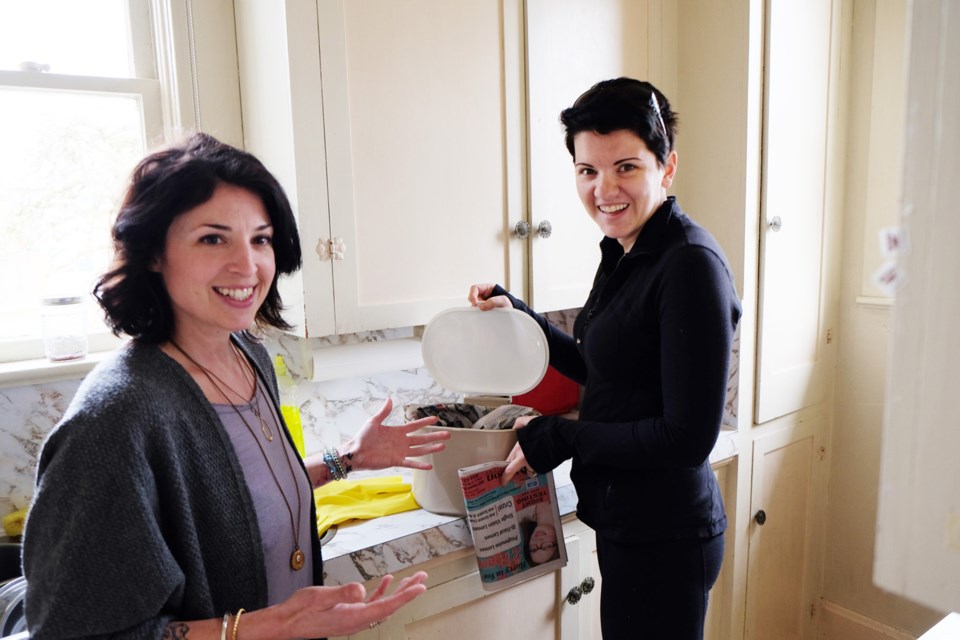Do you think it's Kermit the Frog's fault? Ever since he sang that it wasn't easy being green, it seems there's always been a bit of a stigma attached to trying to become environmentally friendly.
Everyone thinks that, hypothetically, it would be nice to live a greener life - but surely it's hard work, and expensive, and just too much trouble.
Enter Jen Casey.
The local entrepreneur - who's built up her own business, Dimpleskins, around creating all-natural skin care products for babies - is out to help some New West families prove that, in fact, it's not too difficult to live your life in a darker shade of green.
Casey is working as a coach with a new program through the David Suzuki Foundation's Queen of Green. The program guides families through an eight-week journey towards becoming more environmentally conscious, covering four modules of two weeks each: waste, food, toxics and community.
Casey is working with five city families who started out as "entry-level green," finding out where they are succeeding in their green journey and where they can use a little extra help, and offering ideas and guidance to help them achieve each step in the journey.
For each module, she provides information and tip sheets, then works with the family - largely by email - to target a few simple steps they can take in the home.
Casey notes it's important to break the goal of "living green" down into small and manageable changes.
"I think people are intimidated because it can seem overwhelming," she said. "Or people think going green means buying organic, but it goes beyond that."
Each family she's working with has different goals, she notes - for one, the focus may be to reduce garbage; for another, it might be cutting back on water usage.
"I customize each module for each family," she explained.
One of her families is the Schiebler clan, whose Queen's Park home is already on its way to becoming greener. They've already made some changes on the waste front and are currently working on the food module.
Katie Schiebler, a mom of three young children, is spearheading the family's efforts.
She was keen to tackle her overflowing recycling bins and to cut down on waste - not the least of which is the large pile of diapers her household goes through, thanks to one-year-old daughter Sydney. Working with Casey, she ran the numbers and found out that if she just replaced five disposable diapers a day with cloth, she could save a whopping $1,800 a year - and create less landfill into the bargain.
At the same time, she's been able to cut down on some waste by focusing on the idea of the "litterless lunch" - buying large tubs of yogurt and filling reusable snack containers, rather than the single-serving size, for instance.
There, too, she discovered cost savings. Her boys - five-and-a-half-year-old Darwin and two-and-a-half-year-old Forrest - love their Jello. And it didn't take her long to figure out that it made more sense to buy a package of Jello to make their own in large quantities, then portion it out, rather than buying the single-serving lunch-size containers. Plus, she notes, she has more flavour choices and the boys love helping to make their own treat.
Casey noted that the "litterless lunch" is a great concept for just about everyone.
"That's an easy change that any family can make with school-age children," she noted.
On the food front, Schiebler has her boys helping out in the garden - raised beds in their spacious backyard offer space for nutritious and productive crops like kale, spinach, beets, peas, beans and zucchini.
And she's now devoted to using her green waste bin for food scraps, having discovered the simple trick of lining it with newspaper so it doesn't become a smelly and unappealing mess. (As an added bonus, it's Darwin's job to take out the food waste - "it's another job that Darwin kinda likes doing," Schiebler notes.)
It's the fact that all those changes have been so relatively simple that makes it workable for the busy mom.
"It's low pressure," she said.
In future weeks, Casey will be working with the family on finding and eliminating the toxins in the products they use on a daily basis.
That's a big one for many people, she notes, pointing out that toxic ingredients are present in a vast array of household and skin-care products - products that can be replaced in many cases with natural alternatives, some of which can even be easily made at home.
The last module, community, will look at ways that the family can take its efforts out into the wider community and help to spread the "darker shade of green" message.
To help set long-term goals, Casey will check in with her families about six months down the road, and she's hoping to host a get-together with all of them in the fall.
She'll also be running future sessions for more New West families to take part.
Anyone who's interested in taking part in a future session should contact Casey on Twitter, @BestInNewWest.



